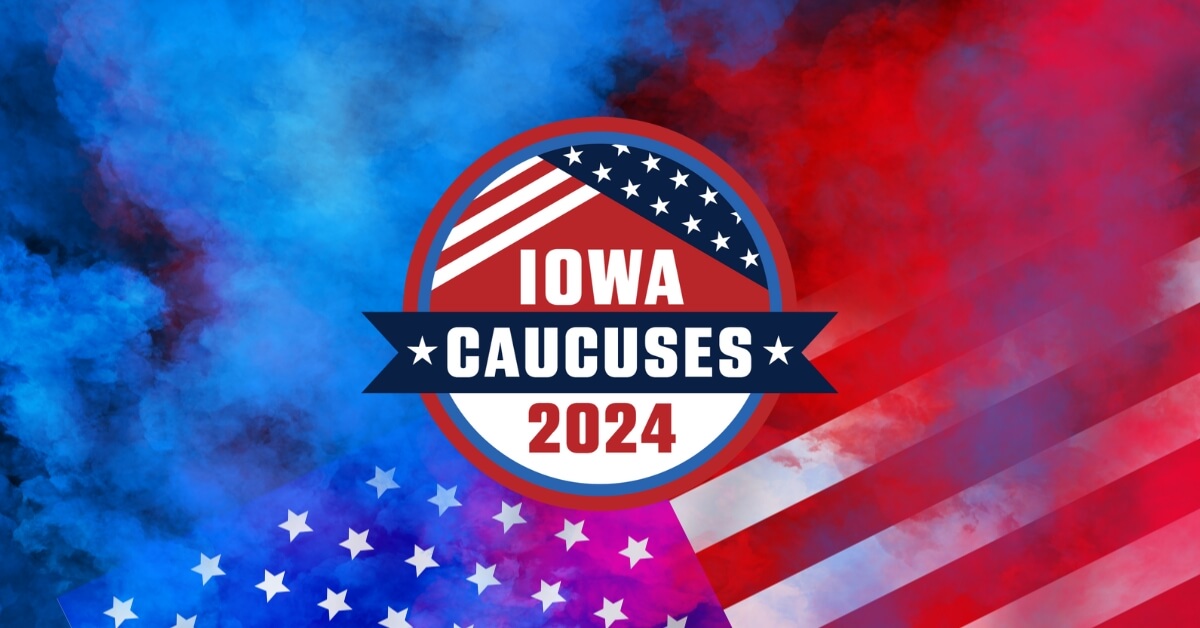Every four years, the United States focuses on Iowa during the fall and early winter, as presidential candidates practically relocate to the state for months of campaigning.
Ordinary citizens engage in discussions with national correspondents over coffee and pie in local diners, sharing their concerns.
Currently, around 32k Americans in the snow-covered upper Midwest are preparing for the Iowa caucuses on January 15, marking the initial stage in selecting the next Republican presidential candidate.
But why? What makes the Iowa caucus so important? And why is it called a “caucus”?
On January 15, 2024, the Iowa Caucus will set the pace for the 2024 Presidential elections. Iowa serves as the nation’s initial electoral test. Actual voters, not elites or pundits, participate in this critical process, making it a barometer for a candidate’s potential nationwide appeal. The early timing allows candidates to assess voter response and refine their campaign strategies.
Why Is Iowa Called a Caucus?
The Iowa caucuses are crucial in the United States presidential selection process.
Registered Republicans aged 18 and above will participate by casting a secret ballot on January 15, writing down the name of their preferred Republican candidate. These slips are tallied, and delegates are proportionally awarded to the candidates based on the vote count.
These delegates play a pivotal role in deciding the esteemed presidential nominee at the Republican National Convention in July, with a tendency to stick with their initial candidate choices.
It’s important to note that the technical distinctions between caucuses and primaries and the differences between how Democrats and Republicans conduct their selection processes are less significant than they may seem.
The primary distinctions lie in the time allocated for voting and the methods used. Iowa Democrats, for instance, will also hold caucuses on January 15, but they employ a mail-in voting process from January 12 until March 5.
Additionally, Democrats elect delegates to county conventions on January 15, leading to the selection of representatives for the Democratic National Convention in Chicago in August.
Primaries are generally perceived as more straightforward ballot processes than caucuses, which used to involve voters physically moving around a room to join candidate preference groups but evolved in 2024.
It’s interesting to note that the term “caucus” originates from the Indigenous word “caucauasu,” meaning “one who advises.”
Why Is Iowa Caucus Important?
What makes Iowa so important in the grand scheme of presidential elections? The answer lies in several factors.
Senator George McGovern, a Democratic contender in the 1972 election, succinctly captured the essence of Iowa’s importance when he said, “Iowa is terribly important. It’s the first test in the nation.”
This first test is conducted not by political elites or pundits but by real, everyday voters. The level of support a candidate garners in Iowa is considered a reasonable indication of how they might perform with the rest of the American electorate.
The early timing of this caucus allows candidates to gauge voters’ responses and make adjustments to their campaign messaging accordingly.
A poor showing in Iowa can be a reality check that prompts some candidates to reassess their viability in the race.
As a result, financially speaking, the candidates invest heavily in Iowa.
In the 2024 Republican nominating contest, a staggering dollar out of every $2.50 spent on TV ads has gone toward 30- and 60-second spots in cities like Des Moines, Cedar Rapids, and Sioux City.
As per NPR, these media markets in Iowa have seen over $100 million of the $258 million in ad spending, making it clear that candidates consider Iowa a battleground for gaining attention, earning media coverage, and securing campaign funds.
One of the key reasons Iowa is highly regarded in the electoral process is its role as a launching pad for candidates, especially those who aren’t front-runners.
Winning or performing strongly in Iowa can generate momentum, garner earned media attention (free mentions in news coverage) and attract financial contributions. It can reshape the dynamics of a primary race.
So, winning Iowa has been a strong indicator of a candidate’s viability in the national race.
So, what do the polls say this year?
The 2024 Republican presidential race in Iowa is showing a solid lead for former President Donald Trump, as indicated by recent polling from Trafalgar (via NPR), placing him at 52 points.
Nikki Haley and Ron DeSantis follow him with 18 points each, and Vivek Ramaswamy with 5 points.
Endorsements from local figures like Governor Kim Reynolds and Attorney General Brenna Bird hold sway in the state.
Campaign efforts also vary, with Haley holding 51 events, DeSantis actively campaigning with 99 events, and Ramaswamy maintaining an impressive pace of nearly ten daily events.
Iowa’s historical record of choosing the eventual Republican nominee is strong at 74%, surpassing the national average of 71%. But the actual results for 2024 remain to be seen.
What do you think about the commotion around the Iowa Caucus? Should this change? Or is the Iowa Caucus a good indicator of polls and should be kept?
Let us know your thoughts and opinions in the comments below.
Source: Financial Review, NPR

